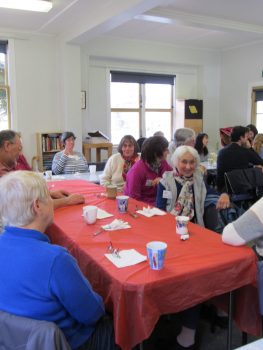NZCFS Rotorua Branch July Newsletter
Greetings to everyone:

Hopefully the catering at June’s meeting did not make you miss our shared lunch to much. I could not make it to the last meeting but I think the speeches from the Mandarin Language assistants helped you a little bit about learning Mandarin.
Unfortunately, Prof. Yang from Victory University Confucius Institute will not be able to come to our July’s meeting, but it will be a pleasure to have Daniel and Jenny Carruthers as guest speakers instead. Prof. Yang will come to our September meeting. Daniel and Jenny would like to keep their topic as a small secret for the moment but I believe it will relate to their working and living experiences in China.
This month’s meeting time will be:
DATE: SUNDAY 24 July
TIME: 12:30 P.M. VENUE:
ROTORUA ARTS VILLAGE, 1240 Hinemaru Street
This time we will have the shared lunch again therefore don’t forget to bring a plate with you.
Just another reminder for any who have not paid their subscription at the last few meetings. The subscription fee stays unchanged as follow:
For payment please contact Norma Millard Lake View Villa, 2/285 Vaughns Rd 3010 07 345 5016
Type of subscription Fee Individual $15; Couple $25; Organisation $25
This time, I will share a brief discussion about the first chapter of Chinese Characteristics – Face. As Smith mentioned, for Chinese people, “face” (面子) is not the front part of the head, but
“a compound noun of multitude, which more meanings than we shall be able to describe, or perhaps to comprehend.”
To be honest, I don’t quite agree with Mr Smith’s example about the ‘actor in a drama’. I would rather describe it in another way, the ‘face’ of a Chinese individual is a combination of different reputations in others’ mind. For example, my ‘face’ to my high school classmates will be: ‘I am settling down and working proudly overseas’. If I unfortunately lost my job and had to move back to my hometown, I would feel loss of ‘face’ if I met any of them on the street. This sample, together with the samples provided by Smith, would explain ‘face’ as a kind of fear of losing ones reputation or being looked down upon among your circle of close friends, or ‘status anxiety’. If you have an opportunity to read Alan De Bottom’s Status Anxiety, it might be easier for you to under this phrase.
Therefore, in order not to lose ‘face’, as you can imagine and probably have done such things as well, people will do some silly things. As I mentioned at May’s meeting, some parents will treat their kid as part of their ‘face.’ If their kids go to a top high school or university but cannot make an average grade in his class or he doesn’t like to study at all, the parents will never say, “My kid is not good at study/he doesn’t like to study”, instead, they will likely say something such as, “He is very smart, the reason is the teacher doesn’t like him/ his classmates distract him from studying.” It is actually very universal but because Chinese society is based on hierarchy losing ‘face’ in front of younger colleagues, children or your subordinate would be an awkward thing. A lot of envy, hostility and revenge comes out of losing ‘face’ in Chinese history.







